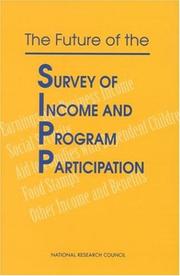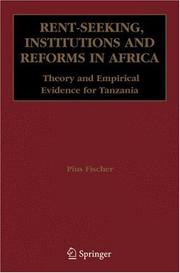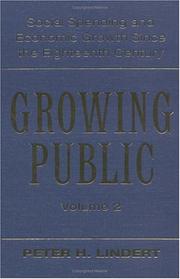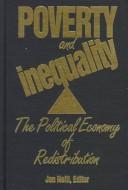| Listing 1 - 10 of 14 | << page >> |
Sort by
|
Book
ISBN: 3428459903 Year: 1986 Publisher: Duncker & Humblot
Abstract | Keywords | Export | Availability | Bookmark
 Loading...
Loading...Choose an application
- Reference Manager
- EndNote
- RefWorks (Direct export to RefWorks)
Transfer payments --- Income distribution --- Government transfer payments --- Payments, Transfer --- Expenditures, Public --- National income --- Accounting --- Einkommenspolitik --- Grundlagen der Volkswirtschaft
Book
ISBN: 3428047931 342844793X Year: 1980 Publisher: Berlin
Abstract | Keywords | Export | Availability | Bookmark
 Loading...
Loading...Choose an application
- Reference Manager
- EndNote
- RefWorks (Direct export to RefWorks)
Social policy --- Income --- Germany --- Income distribution --- Taxation --- Transfer payments --- Government transfer payments --- Payments, Transfer --- Expenditures, Public --- National income --- Accounting --- Staatslehre --- Verfassung --- Mikroökonomie
Book
ISBN: 3030510085 3030510077 Year: 2020 Publisher: Cham : Springer International Publishing : Imprint: Palgrave Macmillan,
Abstract | Keywords | Export | Availability | Bookmark
 Loading...
Loading...Choose an application
- Reference Manager
- EndNote
- RefWorks (Direct export to RefWorks)
In this book, Cecilia Osorio Gonnet takes the reader on a journey from the rise of Conditional Cash Transfers (CCTs) in Mexico and Brazil though their spread across Latin America over the late 20th and early 21st centuries. What makes this text a must read is how Osorio Gonnet analyses this spread; combining an impressive array of qualitative and quantitative data to show how endogenous and exogenous forces interacted to shape the nature of individual CCT programs, within an underlying set of ‘essential’ elements. Forming the fundamental uniqueness of this investigation was Osorio Gonnet’s notable empirical study of the epistemic community that developed, changed, and acted as the catalyst for the spread and understanding of CCTs amongst the regions policymakers. Osorio Gonnet’s core arguments are illustrated a detailed analysis of the diametrically different cases of Chile’s Solidario program and what became Ecuador’s Bono Desarrollo Humano program. Not only will this text help form the basis of future studies through the question it raises in relation to diffusion, but it will be a must read for anyone interested in Conditional Cash Transfers, Comparative Policy Analysis, Policy Studies, Policy Diffusion and Policy Transfer studies. - David Dolowitz, University of Liverpool, UK This book offers readers a deeper understanding of the diffusion process of the Conditional Cash Transfer (CCT) programs in Latin America and the role played by experts and international organizations. CCTs have been increasingly implemented around the world in recent decades, and by 2010, 17 countries in Latin America had adopted them. The evidence suggests that this concentration is due to a process of policy diffusion. International organizations contribute to this process; however, the book’s main argument is that there was another, more important actor involved: a regional epistemic community that increased the availability of information about CCTs and reinforced their legitimacy, playing a role in the domestic processes of formulation and adoption. This book addresses the diffusion of the programs throughout the region; diffusion mechanisms that can help us understand the programs’ adoption (emulation, learning and coercion); and the impacts of key actors on the process (epistemic community, international organizations and policymakers). Cecilia Osorio Gonnet holds a Ph.D. in tPolitical and Social Sciences from the Universitat Pompeu Fabra. Currently, she is an Assistant Professor at the Politics and Government Department, Universidad Alberto Hurtado, Chile. Her most recent book was “Learning or emulating: how social policies are disseminated in Latin America” (2018).
Transfer payments --- Cash transactions --- Money --- Government transfer payments --- Payments, Transfer --- Expenditures, Public --- Income distribution --- National income --- Accounting --- Public policy. --- Social policy. --- Public Policy. --- Social Policy. --- National planning --- State planning --- Economic policy --- Family policy --- Social history
Book
ISBN: 9781565493339 9781565493346 1565493338 1565493346 1565493648 1565493907 9781565493643 Year: 2010 Publisher: Sterling, Va Kumarian
Abstract | Keywords | Export | Availability | Bookmark
 Loading...
Loading...Choose an application
- Reference Manager
- EndNote
- RefWorks (Direct export to RefWorks)
* Argues strongly for overlooked approach to development by showing how the poor use money in ways that confound stereotypical notions of aid and handouts* Team authored by foremost scholars in the development fieldAmid all the complicated economic theories about the causes and solutions to poverty, one idea is so basic it seems radical: just give money to the poor. Despite its skeptics, researchers have found again and again that cash transfers given to significant portions of the population transform the lives of recipients. Countries from Mexico to South Africa to Indonesia are giving money directly to the poor and discovering that they use it wisely - to send their children to school, to start a business and to feed their families.Directly challenging an aid industry that thrives on complexity and mystification, with highly paid consultants designing ever more complicated projects, Just Give Money to the Poor offers the elegant southern alternative - bypass governments and NGOs and let the poor decide how to use their money. Stressing that cash transfers are not charity or a safety net, the authors draw an outline of effective practices that work precisely because they are regular, guaranteed and fair. This book, the first to report on this quiet revolution in an accessible way, is essential reading for policymakers, students of international development and anyone yearning for an alternative to traditional poverty-alleviation methods.
Social policy --- Third World: economic development problems --- Developing countries --- Transfer payments --- Economic assistance --- Poverty --- Government transfer payments --- Payments, Transfer --- Expenditures, Public --- Income distribution --- National income --- Accounting --- #SBIB:39A4 --- #SBIB:327.4H21 --- Toegepaste antropologie --- Kolonisatie / dekolonisatie / post-kolonisatie --- Developing countries: economic development problems --- Transfer payments - Developing countries --- Economic assistance - Developing countries --- Poverty - Developing countries

ISBN: 0309047951 0309585023 0585143390 9780585143392 9780309047951 9780309585026 Year: 1993 Publisher: Washington, D.C. National Academy Press
Abstract | Keywords | Export | Availability | Bookmark
 Loading...
Loading...Choose an application
- Reference Manager
- EndNote
- RefWorks (Direct export to RefWorks)
Transfer payments. --- Income --- Transfer payments --- Household surveys --- Social surveys --- Business & Economics --- Economic History --- Statistical services --- Evaluation --- Methodology --- Evaluation. --- Community surveys --- Surveys, Social --- Surveys, Household --- Government transfer payments --- Payments, Transfer --- Family income --- Fortunes --- Household income --- Personal income --- Social sciences --- Surveys --- Census --- Expenditures, Public --- Income distribution --- National income --- Economics --- Finance --- Property --- Wealth --- Gross national product --- Profit --- Purchasing power --- Research --- Accounting
Book
ISBN: 1139892908 1107424852 1107422817 1107562600 1107417120 1107420865 1139856057 1107419697 1107418356 1107039029 1299842186 9781107417120 9781139856058 9781299842182 9781107419698 9781107418356 9781107039025 9781107420861 9781139892902 9781107424852 9781107422810 9781107562608 Year: 2013 Publisher: Cambridge Cambridge University Press
Abstract | Keywords | Export | Availability | Bookmark
 Loading...
Loading...Choose an application
- Reference Manager
- EndNote
- RefWorks (Direct export to RefWorks)
The rapid spread of large-scale and innovative social transfers in the developing world has made a key contribution to the significant reduction in global poverty over the last decade. Explaining how flagship anti-poverty programmes emerged, this book provides the first comprehensive account of the global growth of social assistance transfers in developing countries. Armando Barrientos begins by focusing on the ethical and conceptual foundations of social assistance, and he discusses the justifications for assisting those in poverty. He provides a primer on poverty analysis, and introduces readers to the theory of optimal transfers. He then shifts the focus to practice, and introduces a classification of social assistance programmes to help readers understand the diversity in approaches and design in developing countries. The book concludes with an analysis of the financing and politics of the emerging institutions and of their potential to address global poverty.
Transfer payments --- Public welfare --- Poverty --- Benevolent institutions --- Poor relief --- Public assistance --- Public charities --- Public relief --- Public welfare reform --- Relief (Aid) --- Social welfare --- Welfare (Public assistance) --- Welfare reform --- Human services --- Social service --- Government transfer payments --- Payments, Transfer --- Expenditures, Public --- Income distribution --- National income --- Government policy --- Accounting --- Social Sciences --- Political Science --- E-books --- Social policy --- Developing countries

ISBN: 128113340X 9786611133405 0387337733 0387337725 1441941495 Year: 2006 Publisher: New York : Springer,
Abstract | Keywords | Export | Availability | Bookmark
 Loading...
Loading...Choose an application
- Reference Manager
- EndNote
- RefWorks (Direct export to RefWorks)
This book identifies rent-seeking behaviour as one of the main causes of poor economic performance, observed, among other places, in many countries of Africa. Rent-seeking describes the ability to capture incomes without producing output or making a productive contribution. Since rent-seekers are often an integral part of an ailing economy and resist the adoption of reforms, understanding and anticipating rent-seeking behaviour is crucial for designing more adequate and effective policy reforms. Following a comprehensive theoretical elaboration of the causes, properties and consequences of rents and rent-seeking strategies in the context of economic reforms and development cooperation, this book presents a detailed case study on rent-seeking within the civil service, parastatal sector and business community. It demonstrates how rent-seekers in Tanzania have systematically delayed or undermined reforms such as tax reforms, trade liberalisation, privatisation or any reforms that aim to restrain corruption and embezzlement. The case study quantifies and evaluates the rent-seeking behaviour of more than 300 parastatal companies, considering their profits and losses, the quality and timeliness of their accounting and the magnitude of support they obtained from 16 different sources. Though it is often difficult to describe rent-seeking empirically—many aspects are hidden and obscured by all sorts of fake explanations—the study at hand explores the maze of endless, general and disaggregated information and traces as many indications of rent-seeking as possible. This broad and detailed approach makes the study unique not only for Tanzania but also within the literature on rent-seeking and development cooperation.
Rent (Economic theory) --- Transfer payments --- Tanzania --- Economic conditions. --- Government transfer payments --- Payments, Transfer --- Expenditures, Public --- Income distribution --- National income --- Economic rent --- Ground-rent --- Economics --- Land use --- Rent seeking --- Accounting --- Development economics. --- Culture-Study and teaching. --- Economic policy. --- Social policy. --- Development Economics. --- Regional and Cultural Studies. --- Economic Policy. --- Social Policy. --- National planning --- State planning --- Economic policy --- Family policy --- Social history --- Economic nationalism --- Economic planning --- Planning --- National security --- Social policy --- Economic development --- Culture—Study and teaching.
Book
ISBN: 1847318665 1472561031 1280125551 9786613529411 1847318436 9781847318435 9781280125553 9781849460521 1849460523 9781847318664 9781472561039 Year: 2011 Publisher: Oxford Portland, OR Hart Publishing
Abstract | Keywords | Export | Availability | Bookmark
 Loading...
Loading...Choose an application
- Reference Manager
- EndNote
- RefWorks (Direct export to RefWorks)
Examining the legal history of the order to pay money initiating a funds transfer, the author tracks basic principles of modern law to those that governed the payment order of Antiquity and the Middle Ages. Exploring the legal nature of the payment order and its underpinning in light of contemporary institutions and payment mechanisms, the book traces the evolution of money, payment mechanisms and the law that governs them, from developments in Ancient Mesopotamia, Ancient Greece, Rome, and Greco-Roman Egypt, through medieval Europe and post-medieval England. Doctrine is examined in Jewish, Islamic, Roman, common and civil laws. Investigating such diverse legal systems and doctrines at the intersection of laws governing bank deposits, obligations, the assignment of debts, and negotiable instruments, the author identifies the common denominator for the evolving legal principles and speculates on possible reciprocity. At the same time he challenges the idea of 'law merchant' as a mercantile creation. The book provides an account of the evolution of payment law as a distinct cohesive body of legal doctrine applicable to funds transfers. It shows how principles of law developed in tandem with the evolution of banking and in response to changing circumstances and proposes a redefinition of 'law merchant'. The author points to deposit banking and emerging technologies as embodying a great potential for future non-cash payment system growth. However, he recommends caution in predicting both the future of deposit banking and the overall impact of technology. At the same time he expresses confidence in the durability of legal doctrine to continue to evolve and accommodate future payment system developments
Payment --- Commercial law --- Extinguishment of debts --- Performance (Law) --- Balance of trade --- Debtor and creditor --- History. --- Law and legislation --- Transfer payments --- Negotiable instruments --- Banks and banking --- Government transfer payments --- Payments, Transfer --- Expenditures, Public --- Income distribution --- National income --- Bills and notes --- Bills of credit --- Commercial paper --- Credit, Bills of --- Credit, Titles of --- Instruments, Negotiable --- Negotiable notes --- Negotiable paper --- Titles of credit --- Choses in action --- Commercial documents --- Legal instruments --- Drafts --- Financial instruments --- History --- Law and legislation&delete& --- Accounting --- E-books

ISBN: 0521821754 0521529174 1107145708 0511195508 0511196164 051131521X 0511510721 1280541245 0511194129 0511194862 9780511196164 9780511195501 0511192703 9780511192708 9786610541249 6610541248 9780521821759 Year: 2004 Publisher: Cambridge, UK New York Cambridge University Press
Abstract | Keywords | Export | Availability | Bookmark
 Loading...
Loading...Choose an application
- Reference Manager
- EndNote
- RefWorks (Direct export to RefWorks)
Growing Public examines the question of whether social policies that redistribute income impose constraints on economic growth. What kept prospering nations from using taxes for social programs until the end of the nineteenth century? Why did taxes and spending then grow so much, and what are the prospects for social spending in this century? Why did North America become a leader in public education in some ways and not others? Lindert finds answers in the economic history and logic of political voice, population ageing, and income growth. Contrary to traditional beliefs, the net national costs of government social programs are virtually zero. This book not only shows that no Darwinian mechanism has punished the welfare states, but uses history to explain why this surprising result makes sense. Contrary to the intuition of many economists and the ideology of many politicians, social spending has contributed to, rather than inhibited, economic growth.
338 <09> --- AA / International- internationaal --- 330.580 --- 202 --- 368.40 --- Economische geschiedenis --- Gecontroleerde economie. Geleide economie. Welvaarststaat. Algemeenheden. --- Sociale organisatie. --- Sociale voorzorg en verzekeringen. Sociale zekerheid: algemeenheden. --- Government spending policy --- Income distribution --- Transfer payments --- Welfare economics --- History --- 338 <09> Economische geschiedenis --- Gecontroleerde economie. Geleide economie. Welvaarststaat. Algemeenheden --- Sociale organisatie --- Sociale voorzorg en verzekeringen. Sociale zekerheid: algemeenheden --- Business, Economy and Management --- Economics --- Economic policy --- Social policy --- Government transfer payments --- Payments, Transfer --- Expenditures, Public --- National income --- Distribution of income --- Income inequality --- Inequality of income --- Distribution (Economic theory) --- Disposable income --- Public spending policy --- Spending policy, Government --- Finance, Public --- Full employment policies --- Unfunded mandates --- Accounting --- Government policy

ISBN: 0585314403 9780585314402 0880991828 9780880991827 088099181X 9780880991810 Year: 1997 Publisher: Kalamazoo, Mich. W.E. Upjohn Institute for Employment Research
Abstract | Keywords | Export | Availability | Bookmark
 Loading...
Loading...Choose an application
- Reference Manager
- EndNote
- RefWorks (Direct export to RefWorks)
Poverty --- Income distribution --- Transfer payments --- Economic History --- Business & Economics --- Government transfer payments --- Payments, Transfer --- Expenditures, Public --- National income --- Distribution of income --- Income inequality --- Inequality of income --- Distribution (Economic theory) --- Disposable income --- Destitution --- Wealth --- Basic needs --- Begging --- Poor --- Subsistence economy --- Congresses --- Accounting --- 313 --- 339.21 --- US / United States of America - USA - Verenigde Staten - Etats Unis --- Levenswijze en levensstandaard. Levensminimum. sociale indicatoren (Studiën) --- Ongelijkheid en herverdeling van vermogens en inkomens. Inkomensbeleid --- Congresses. --- Poverty - United States - Congresses. --- Income distribution - United States - Congresses. --- Transfer payments - United States - Congresses.
| Listing 1 - 10 of 14 | << page >> |
Sort by
|

 Search
Search Feedback
Feedback About UniCat
About UniCat  Help
Help News
News